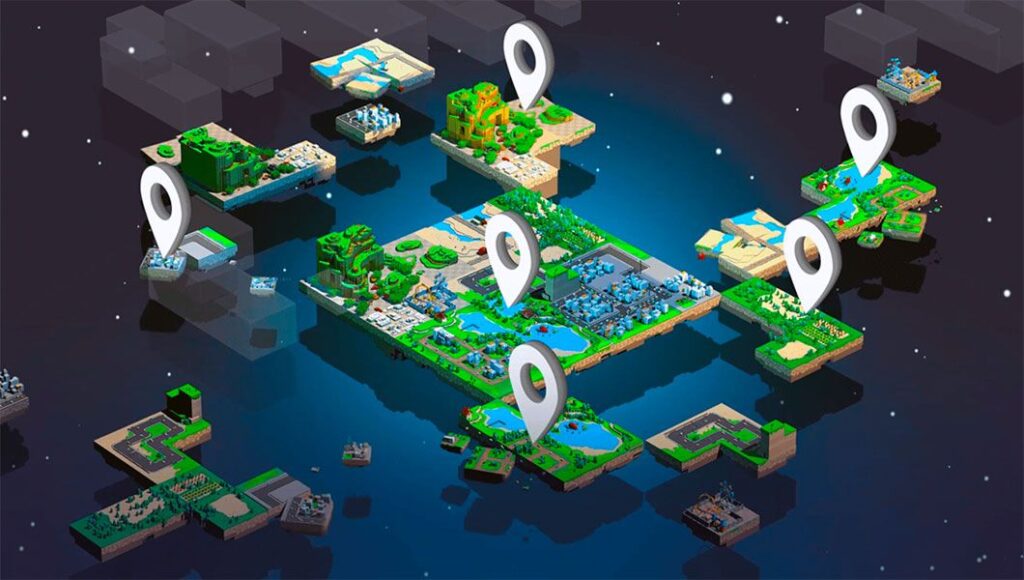
In recent years, digital real estate has emerged as one of the most exciting and innovative sectors in investment and business. Whether you’re a seasoned investor or exploring new ways to build wealth, digital real estate offers countless opportunities. The possibilities are endless, from virtual land in the metaverse to digital assets like domain names and websites. In this comprehensive guide, we’ll dive into digital real estate, explaining what it is, how it works, and how you can start investing in this fascinating and ever-growing market.
Understanding Digital Real Estate
Types of Digital Real Estate
Digital real estate encompasses various virtual assets, all holding significant value in today’s increasingly online world. At its core, digital real estate refers to any online asset that can be bought, sold, or rented in the digital sphere. This includes:
- Domain Names: Just as physical property can be a valuable location in the real world, domain names are highly sought-after in the digital space. A catchy, brandable domain name can have significant business potential. Companies spend millions of dollars acquiring short, memorable domain names that align with their brand.
- Websites and Blogs: Owning a website or blog can be a lucrative form of digital real estate. Websites with high traffic, established authority, or monetization methods (such as affiliate marketing or ads) can generate substantial passive income.
- Virtual Real Estate in Virtual Worlds: Platforms like Decentraland, The Sandbox, and Somnium Space offer virtual land where users can buy, sell, or develop their properties. These virtual worlds mirror physical real estate in many ways, with developers building virtual storefronts, entertainment venues, and other assets.
- NFTs (Non-Fungible Tokens): NFTs tied to virtual land or assets represent a new frontier in digital real estate. NFTs can signify ownership of unique, blockchain-based assets that may have real-world value, such as digital artwork or virtual real estate.
How Digital Real Estate Works
How digital real estate operates can seem quite different from traditional property ownership, but the underlying principles are surprisingly similar. When you buy a piece of digital real estate, you acquire you’re a valuable asset that can generate revenue. For example, purchasing a popular domain name or a well-trafficked website can yield profits from ads, affiliate links, or direct sales.
Many digital real estate transactions occur on platforms facilitating digital property buying, selling, and leasing. Blockchain technology, especially cryptocurrency, plays a crucial role in this space. Transactions are recorded on secure, decentralized ledgers, ensuring transparency and eliminating the need for intermediaries like banks.
The Role of Cryptocurrency in Digital Real Estate
Cryptocurrency has revolutionized the way digital real estate is bought and sold. Many virtual worlds and digital property platforms accept cryptocurrencies like Bitcoin and Ethereum and even native tokens specific to the platform, such as MANA in Decentraland or SAND in The Sandbox.
Digital currency removes geographical boundaries, allowing global investors to participate in virtual real estate markets. Cryptocurrencies also provide increased transaction security, as blockchain technology ensures transparency and reduces the risk of fraud. For investors, this opens up new avenues for building a portfolio of digital assets with the potential for significant returns.
The Rise of Virtual Worlds and the Metaverse
What is the Metaverse and How Does it Relate to Digital Real Estate?

The metaverse is an expansive, interconnected virtual universe that combines virtual reality (VR), augmented reality (AR), and social interaction. Think of it as a digital space where people can socialize, work, play, and shop—much like the real world, but entirely online. Within the metaverse, digital real estate is just as valuable as physical land in the real world.
Virtual worlds like Decentraland and The Sandbox allow users to buy, sell, and develop virtual land, creating a booming market for digital real estate. These virtual spaces offer endless possibilities for building, creating, and interacting with other users, making them highly attractive to investors and businesses.
Investing in Virtual Land
Investing in virtual land within the metaverse is similar to investing in physical real estate, except it happens in a wholly digital environment. Virtual land is typically purchased using cryptocurrency, and its value can fluctuate based on demand, location, and the area’s development potential. Virtual land owners can rent their space, build businesses, or host events like physical real estate, creating income-generating opportunities.
Some virtual properties have already sold for millions of dollars, attracting significant attention from high-profile investors and major brands. For instance, in Decentraland, a piece of virtual land was sold for over $2 million in 2021, signaling the growing value of digital real estate.
Building and Monetizing Virtual Properties
Once you own virtual land, the next step is developing it. Much like how physical property owners construct buildings to attract tenants, virtual landowners can build experiences, businesses, or art installations that attract users. For example, virtual shops can sell digital goods or services, while virtual entertainment venues might host concerts or movie screenings.
Businesses also enter the virtual space, using digital properties for brand activation and marketing campaigns. Companies like Nike and Coca-Cola have already established virtual storefronts, demonstrating the potential for profit in virtual real estate.
Benefits and Challenges of Digital Real Estate Investment
Benefits of Investing in Digital Real Estate

Digital real estate offers several unique benefits compared to traditional property investment. One of the most significant advantages is accessibility. While purchasing physical property requires substantial capital, starting with digital real estate can be more affordable, with some virtual land pieces available for as little as $10 or $20.
Additionally, digital real estate can generate passive income by renting out virtual space, selling digital assets, or advertising. Investors can also scale their digital portfolios globally, eliminating geographical constraints. Furthermore, the lack of physical maintenance and the ease of managing digital properties make this investment particularly appealing.
Challenges and Risks
However, digital real estate also comes with risks. The volatility of the virtual land market can be unpredictable, with asset values fluctuating drastically. As the market is still in its early stages, legal frameworks and regulations are unclear, which could pose challenges for investors. Cybersecurity risks, such as hacking and fraud, are also a concern, as digital properties are susceptible to cyberattacks.
Additionally, many virtual platforms are still in their infancy and could become obsolete, leaving landowners with no way to access or profit from their investments.
The Future of Digital Real Estate
Emerging Trends in Digital Real Estate

The future of digital real estate looks bright, with new technologies such as artificial intelligence (AI), virtual reality (VR), and the Internet of Things (IoT) set to significantly shape virtual spaces. These technologies will make digital real estate more immersive and interactive, enhancing user experience and engagement.
Additionally, as more companies and brands enter the metaverse and virtual worlds, the demand for digital real estate will likely grow. Already, many businesses are setting up virtual offices, storefronts, and experiential spaces to engage with customers in new ways.
The Impact of 5G and High-Speed Internet
5G and high-speed internet are expected to drive the growth of digital real estate by making virtual worlds more accessible and enjoyable. With faster internet speeds, users can navigate and interact with virtual spaces more seamlessly, enhancing the overall experience. This improvement in connectivity will make virtual real estate investments even more attractive.
Predictions for Digital Real Estate in the Next Decade
In the coming years, we expect exponential digital real estate market growth. As the metaverse expands and technology improves, virtual properties will become more mainstream, with more users participating in digital worlds. The line between physical and digital assets will continue to blur, creating new investment opportunities and business models.
Conclusion
Digital real estate offers investors, entrepreneurs, and creators an exciting new frontier. The opportunities are vast, from virtual land in the metaverse to domain names and websites. As technology evolves and more people enter the digital space, the value of virtual assets will only grow. While risks and challenges remain, the potential for profit in digital real estate is undeniable.
FAQs
What is the difference between digital real estate and traditional real estate?
- Digital real estate refers to assets in the virtual world, such as websites, virtual land, and domain names, whereas traditional real estate involves physical property.
How do I buy virtual land in the metaverse?
- To buy virtual land, you must choose a platform like Decentraland or The Sandbox, set up a cryptocurrency wallet, and use their native tokens to make purchases.
What are the risks associated with investing in digital real estate?
- Risks include market volatility, security concerns, and potential platform obsolescence. Legal and regulatory frameworks are also still developing.
Can I make money from digital real estate investments?
- Yes, through methods such as selling virtual assets, renting out virtual land, or using the space for business activities.
How does cryptocurrency play a role in digital real estate transactions?
- Cryptocurrency facilitates fast, secure transactions and removes geographical boundaries for digital real estate investments.
What are the best virtual worlds for investing in digital real estate?
- Popular platforms include Decentraland, The Sandbox, and Somnium Space, each offering virtual land ownership and development opportunities.
How do I monetize my virtual property?
- You can monetize your virtual property by renting out space, hosting events, or setting up virtual stores to sell digital products.
What platforms can I use to manage my digital real estate assets?
- Platforms like OpenSea and Decentral and’sDecentraland’s marketplace allow users to buy,

